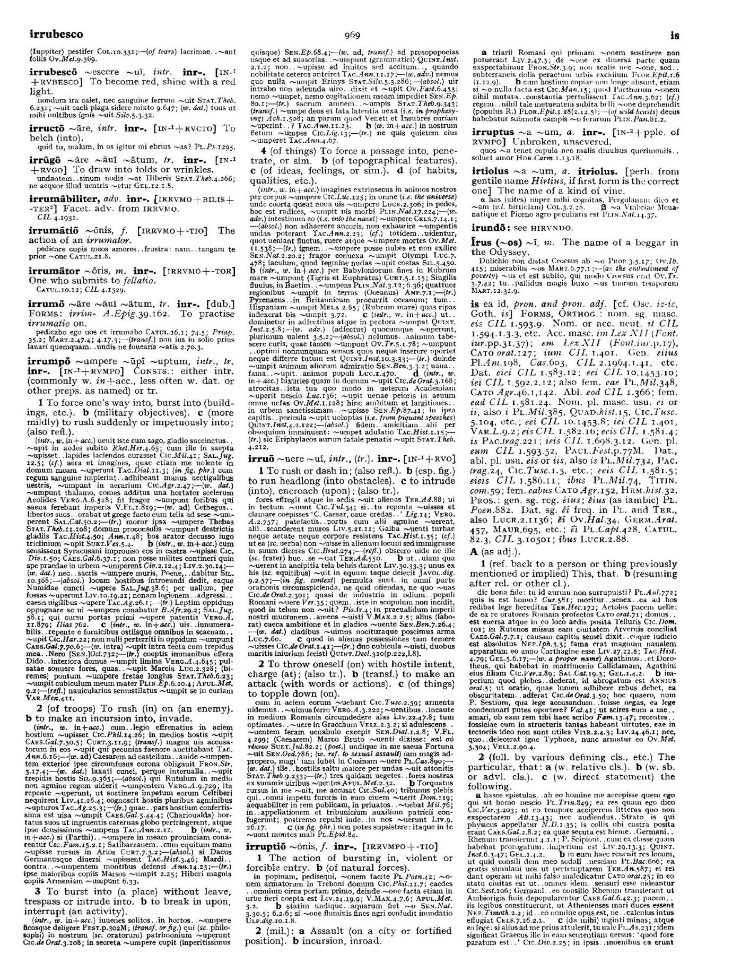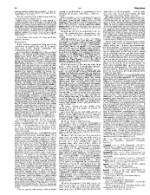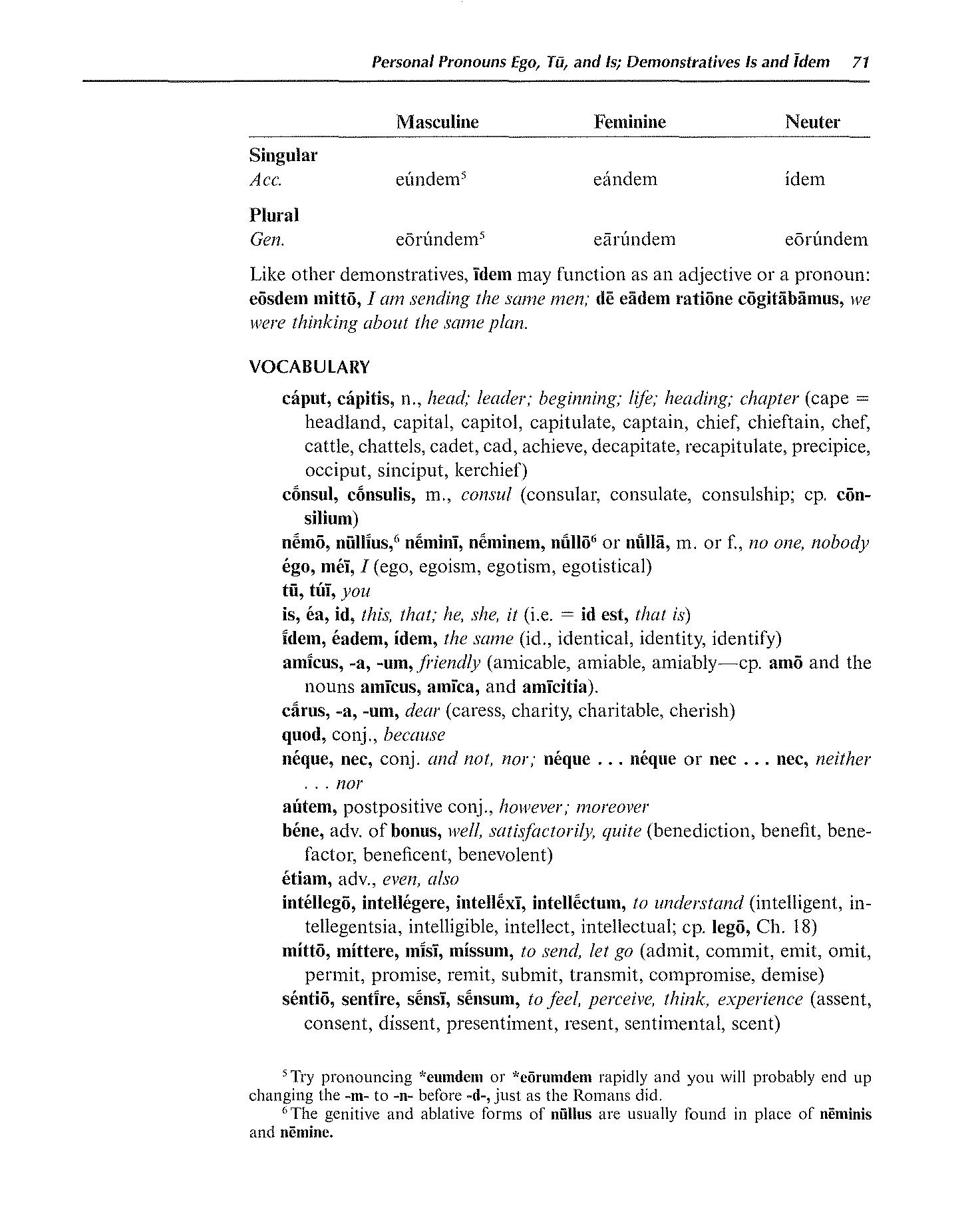
page_listing.tpl
page_subListingDetails.tpl
sub_listingDetails_style1.tpl
sub_listingDetails.title.tpl
is, ea, id he, she, it
is, ea, id is a Latin Pronoun that primarily means he, she, it.
Definitions for is, ea, id
Wheelock's Latin
Pronoun
- 1
this, that, he she, it
English derivatives:
i.e. =id est that is
Oxford Latin Dictionary
Pronoun
- 1
(ref. back to a person or thing previously mentioned or implied) He, she, it. (b) (neut.) that, fact, event. action, statement, etc. (c) (used instead of refl. pron.).
- 2
(picking up the subj. or obj. of a sent. after an intervening cl.). (b) (for emphasis, colloq., immediately foll. the sb. to which it refers). (c) (resuming after a rel., sb., or advl. cls., etc.). (d) (used to avoid repeating a rel. pron. when the antecedent is the same). (e) (w. adjs.) one, such.
Adjective
- 1
(ref. back to a person or thing previously mentioned or impled) This, that. (b) resuming after rel./ or other cl.).
- 2
(foll. by various defining cls., etc.) The particular, that: (a) (w. relative cls.) (b) (w. sb. or advl. cls.) (c) (w. direct statement) the following.
- 3
(expr. nature or sim. rather than identity) Of that kind or degree. such.
- 4
id genus, eius modi. Of that kind (see GENVS, MODVS).
Sentences with is, ea, id
Latin to English
Is est bonus.Compare He is good.
Id meīs oculīs vīdī.Compare I saw it with my own eyes.
Id cum virtūte fēcit.Compare He did it with courage (=how?; courageously).
Eā nocte profectus, Caesar ad quandam īnsulam clārissimam vēnit.Compare Having set out that night, Caesar came to a certain very famous island.
Id quidem est facile dictū sed difficile factū!Compare This is, indeed, easy to say but difficult to do!
Ea libertas est qui pectus purum et firmum gestitat; aliae res obnoxiosae nocte in obscura latent.Compare Freedom is having a pure and dauntless heart; all else is slavery and lies hidden in darkness.
Is in hic disputatio casus quidam, ne facio, impedio.Compare Some chance prevented my doing that in this discussion.
Is ita moderor cursus navis iubeo, ut idem tempus exercitus ostendo et classis portus intro.Compare He had been ordered so to regulate the course of the vessels, that the army might become visible and the fleet enter the harbour at the same time.
Data sources
Notes
- Definitions
- Frederick M. Wheelock, Wheelock's Latin, 6th ed., rev. Richard A. LaFleur (New York, NY: HarperCollins Publishers, 2005): 71.
- P. G. W. Glare, Oxford Latin Dictionary, Vols. 1-8 (Oxford: Clarendon Press, 1982): 969.
- Word frequencies
- Christopher Francese, "Latin Core Vocabulary," Dickinson College Commentaries, last modified 2014, http://dcc.dickinson.edu.
- Paul B. Diederich, The Frequency of Latin Words and Their Endings, PhD diss., (Columbia University, 1939).
- Louis Delatte, Suzanne Govaerts, Joseph Denooz, and Etienne Evrard, Dictionnaire fréquentiel et index inverse de la langue latine [Frequency Dictionary and Inverse Index of the Latin Language] (Liège, Belgium: Laboratoire d'analyse statistique des langues anciennes de l'Université de Liège [L.A.S.L.A.], 1981): 119.
Bibliography
Allen, Joseph H. Allen and Greenough's New Latin Grammar for Schools and Colleges: Founded on Comparative Grammar. Edited by James B. Greenough, George L. Kittredge, Albert A. Howard, and Benjamin L. D'Ooge. Boston, MA: Ginn & Company, 1903.
Crystal, David. A Dictionary of Linguistics and Phonetics. 6th ed. Oxford, UK: Blackwell Publishing, 2008.
Delatte, Louis, Suzanne Govaerts, Joseph Denooz, and Etienne Evrard. Dictionnaire fréquentiel et index inverse de la langue latine [Frequency Dictionary and Inverse Index of the Latin Language]. Liège, Belgium: Laboratoire d'analyse statistique des langues anciennes de l'Université de Liège (L.A.S.L.A.), 1981.
Diederich, Paul B. The Frequency of Latin Words and Their Endings. PhD diss., Columbia University, 1939.
Francese, Christopher. "Latin Core Vocabulary." Dickinson College Commentaries. Last modified 2014. http://dcc.dickinson.edu/latin-vocabulary-list.
Gildersleeve, Basil L., and Gonzales Lodge. Gildersleeve's Latin Grammar: Third Edition, Revised, and Enlarged. 3rd ed. London, England: Macmillan and Co., 1903.
Glare, Peter G.W. Oxford Latin Dictionary. Vols. 1-8. Oxford, England: Clarendon Press, 1982.
Krüger, Bernd. "Latin Conjugation Tables." Cactus2000. Accessed May 5, 2023. https://latin.cactus2000.de/index.en.php.
Pierson, Nick. "Sound of Text." Accessed October 26, 2019. https://soundoftext.com.
Wheelock, Frederick M. Wheelock's Latin. 6th ed. Revised by Richard A. LaFleur. New York, NY: HarperCollins Publishers, 2005.
Wiktionary Contributors. "Victionarium." Wikimedia Foundation, Inc. Updated March 18, 2019. https://la.wiktionary.org/wiki/Victionarium:Pagina_prima.
Citation
Chicago (17th ed.)
Allo Contributors. "is, ea, id (pron.) - Latin Word Definition." Allo Latin Dictionary. Last modified . Accessed February 23, 2026. http://ancientlanguages.org/latin/dictionary/is-ea-id.
Entry created on . Last updated on .








